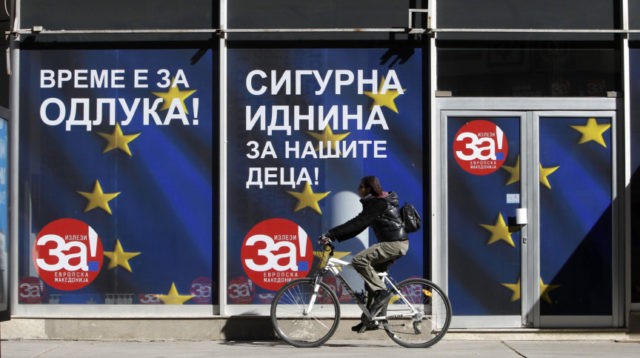SKOPJE, Macedonia (AP) — Macedonians have had a country to call their own for less than three decades. Now, the citizens of one of Europe’s youngest countries are being asked to weigh matters of national identity and national interest as they decide a fundamental question: what their homeland will be called.
A referendum set for Sunday in Macedonia seeks voter support for changing the Balkan nation’s name to North Macedonia. Greece has agreed to drop longstanding objections to neighboring Macedonia joining NATO and eventually becoming a member of the European Union, if the new name is approved.
The proposed “North” prefix might seem minor, but it touches a nerve in the former Yugoslav republic that declared independence in 1991, and in Greece, which has a province named Macedonia that was the birthplace of the ancient warrior king Alexander the Great.
After decades of tortuous and fruitless negotiations between Athens and Skopje, Macedonia’s prime minister agreed to the change to North Macedonia. In return, the prime minister of Greece said his country would stop blocking Macedonia from pursuing NATO membership.
The referendum asks Macedonian voters: “Are you in favor of membership in the European Union and NATO by accepting the deal between (the) Republic of Macedonia and Republic of Greece?”
The agreement has met fierce opposition in both countries, with critics accusing their respective governments of conceding too much.
Some Greeks remain suspicious that Macedonia harbors territorial and historical claims to Macedonia province. Macedonian opponents see changing their country’s name as a national humiliation.
Opinion polls nonetheless have indicated a likely win for the “yes” vote, although it is unclear if voter turnout will reach the 50-percent threshold required for the result to be valid. But even if turnout is below the required 50 percent, if most of the people vote “yes” it will give parliament and the government a mandate to proceed.
If voters back the deal on Sunday, Macedonia will then have to amend its constitution. The final step for NATO admission is ratification of the June deal by Greece’s parliament, which is expected to vote only after Macedonia completes all necessary procedures.
The West has taken a keen interest in the referendum. German Chancellor Angela Merkel, NATO Secretary-General Jens Stoltenberg and U.S. Defense Secretary Jim Mattis were among the Western officials who visited Macedonia in recent weeks to urge voters to mark “yes” on their ballots.
Russia is against NATO picking up another member in a part of Europe that was within its sphere of influence for decades. Mattis has said there was “no doubt” Moscow funded groups inside Macedonia to campaign against the name change.
Supporters of the deal, led by Prime Minister Zoran Zaev, say it will create prosperity by bringing the small, landlocked Balkan country into the fold of international institutions.
The decision is between “integration and isolation,” Zaev said during a recent campaign rally. “There is no other alternative for the Republic of Macedonia than integration into NATO and the EU.”
But President Gjorge Ivanov has said he won’t vote in the referendum and encouraged other voters to do the same — a move seen as a call for a boycott. Ivanov, a conservative, said at the U.N. General Assembly in New York on Thursday that the proposed name change Zaev negotiated would be a “flagrant violation of sovereignty.”
More than 70 small political parties and civic associations campaigned against the deal under the umbrella of a coalition called Macedonia is Boycotting. The country’s conservative opposition stopped short of asking voters to stay home.
“On Sunday, this generation is confronted with the choice of succumbing to the historical challenge, falling on its knees, folding its spine and giving up its own identity,” Igor Janusev, a leading member of Macedonia’s main opposition party, VMRO-DPMNE, said in a statement. “Or to continue to fight and proudly transmit to future generations an example of how to keep what is yours.”
For retired economist Ljiljana Dimitrieva, the referendum presents a tough choice.
“Even with bitterness in my heart — there is no reason to ask someone to change their name— I’ll vote ‘yes’ because of the future for all our children, for their opportunities,” the 79-year-old Skopje resident said. “We have no other alternative.”
Others see it differently. Homemaker Marina Stevcevksa, 55, said she doesn’t intend to cast her ballot despite wanting Macedonia to join NATO and the EU.
“I’ve decided to boycott,” Stevcevksa said. “I want Macedonia to be in NATO and EU, but I don’t want everything which has an adjective ‘Macedonian’ to disappear.”
Macedonia’s ethnic Albanian minority, which makes up about a quarter of the country’s population of roughly 2 million, is expected to play a crucial role in the referendum’s outcome.
Members of the minority fought an armed insurgency against the government for greater rights in 2001. With a much looser emotional connection to the name Macedonia, ethnic Albanian voters are expected to back the name deal.
“They will vote for NATO, they will vote for European Union. They will vote for the future. They will vote for peace, stability and security,” said Ali Ahmeti, head of Macedonia’s ethnic Albanian DUI party. “I think there is no Plan B, and I don’t want to think about Plan B because I don’t want to return to the past. The past is painful and it should not be repeated.”
___
Elena Becatoros in Athens, Greece contributed to this report.

COMMENTS
Please let us know if you're having issues with commenting.